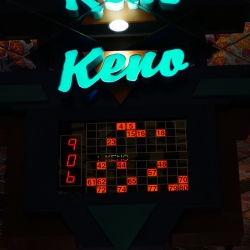On November 7, voters in ten New Hampshire cities voted on whether or not they should offer keno games in community bars and restaurants. The referendum called for keno gaming in order to fund public kindergarten programs. The off-year election produced mixed results for those communities.
Seven communities approved keno gambling, while three opted to reject the proposal. Voters in Nashua, Rochester, Laconia, Berlin, Claremont, Manchester, and Somersworth approved the keno measure, while the residents of Dover, Keene, and Concord rejected keno gambling.
In the leadup to the November 7 election, officials sold keno gambling as a way to raise revenues for New Hampshire kindergartens. The way the law would have been enacted might have caused cities to reject the ballot initiative, because cities would have received a certain level of funding whether they accepted keno or not.
Slim Victory for Keno in Rochester
As it is, certain results could change, pending recounts. That is especially true in Rochester, because Rochester’s keno measure was decided by a single vote, with 1,036 voters in favor and 1,035 residents against the plan.
The Rochester city clerk originally stated that the referendum had failed, but when it was determined that two numbers had been transposed during the confirmation process, the city clerk’s office changed the outcome.
Outcomes in the other cities were more decisive. Manchester’s approved keno with 62% of the vote. Berlin approved at a 72% clip. Keno was legalized in Nashua by a 55% to 45% margin.
Keno Rejected in 3 New Hampshire Cities
The story was completely different in Concord, Dover, and Keene, where voters rejected gambling expansion by comfortable margins. Dover Mayor Karen Weston said while speaking with the New Hampshire Union Leader, “I’m surprised that the keno didn’t pass. I know a lot of people were against it, but it was funding for full-day kindergarten.”
New Hampshire State Keno Law
A law legalizing keno was passed last year by state legislators. As Illinois and Missouri did with video gambling terminals and Georgia did with alcohol sales, the decision on whether or not to make the game accessible to those who hold a liquor license was left up to the individual municipalities.
Keno tax revenues will be distributed statewide, a measure which might have discouraged some cities for voting for more gambling. Though the keno law was sold as a way to raise funding for kindergarten programs, those programs were not dependent on local adoption of the keno law. Residents knew they would receive funding for their kindergarten programs whether they voted “Yes” or not.
While funding goes to cities throughout the state, those which do not accept increase gambling will not get full-day kindergarten funding. State officials predict that schools that offer full-day kindergarten will see a growth of $1,100 per kindergartener due to the new revenue stream, but nearly 75% of New Hampshire school districts already offer full-day kindergarten. The state only pays half of the standard per-student amount.
New Hampshire Keno Revenue Projections
Should keno revenues exceed expectations, that number could rise to as much as $1,800 per student. The State’s lottery commission officials estimate that the keno games could raise as much as $443 million for education, but that was with 10 cities involved in expanded gambling. The $443 million benchmark is less likely to happen, since 30% of the cities rejected the proposal.
New Hampshire officials projected their numbers based on Massachusetts keno revenues. Records show that Massachusetts takes in $900 million a year in its keno game, while 2.5% of the Massachusetts money totals come from New Hampshire residents.
Keno Gambling Pros and Cons
Many of New Hampshire’s local officials believe that the addition of the keno games is a bad choice, because it will take money from those who cannot afford to lose gambling revenues – the proverbial tax on the poor. Other leaders voiced concerns that keno gambling could lead to addictive behavior, creating a social problem for the sake of school funding.
Restaurant and bar owners throughout the Granite State were in favor of keno gambling. Venues that host the games would receive an eight percent commission on all of their wagers at their location. Keno gaming is a potentially lucrative revenue stream for local businesses that offer the game.
Concord rejected keno games by about 500 votes, so it is a big defeat for local officials and its small business owners. Several Concord schools had submitted applications to be a part of the full-day kindergarten funding program. Up to 65 restaurants and bars in the city would have been eligible to house keno games, had they gained a gaming license.

